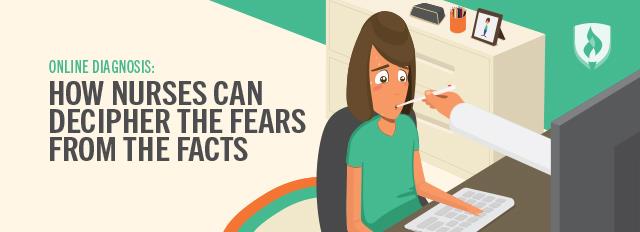
You’ve lost your voice, your head is aching and there’s a weird throbbing sensation in your side. Ten years ago, your first instinct would have been to call your trusted family physician. Now when people experience aches and pains, they often turn to a different resource: Dr. Google.
Sites like WebMD and other “symptom checkers” make it all too easy for the average patient to become their own medical specialist. With just a few keystrokes, Dr. Google has produced a long list of possible illnesses, ranging from bronchitis to asbestos exposure to cancer.
These virtual tools that were created to help patients have become quite the headache for medical professionals. As a nurse, it’s likely routine to see dozens of patients each week who are convinced they’ve contracted a terminal illness. So how can you effectively treat these patients and sort fact from fiction?
We spoke with medical professionals who are experienced in treating patients who have received an online diagnosis. Get their advice for dealing with these sensitive situations.
What to do when you encounter an online diagnosis
Patients who have already received an online diagnosis from Dr. Google may not be your favorite people to work with, but these tips will help you handle the situation with patience and professionalism.
1. Adjust your attitude
The first step nurses should take when treating a self-diagnosed patient is bringing a positive attitude to the interaction. Many nurses dread dealing with patients who are convinced they have a serious health problem, but this negative attitude is no way to start off a successful care relationship with your patient.
Self-diagnosed patients may not be the easiest to handle, but that doesn’t mean your work with them has to have a negative overtone. It’s all about perspective, according to Jim Lebret, MD, primary care doctor as Bellevue Hospital and associate professor at the NYU School of Medicine.
“I enjoy seeing self-diagnosed patients,” Lebret admits. “It shows a level of engagement that makes me look forward to working together.”
Bring an upbeat attitude to the interaction, and sincerely listen to the patient’s concerns, no matter how ludicrous they may sound. Lebret starts off these interactions by telling his patients something like this: “You’ve known your body for decades. I’ve only known you for a few minutes. I respect the insight that you bring. Let’s combine the best of your knowledge and my knowledge.”
This collaborative, respectful attitude immediately puts patients at ease and lets them know that their concerns are truly being taken into consideration. This sets the stage for open communication and cooperation on both sides of the table.
2. Calm their fears
An online diagnosis may cause patients to be anxious and fearful they’re suffering from a horrible disease or terminal illness. It’s important to calm them down and quell these fears before moving forward toward diagnosis and treatment.
“The most important thing is to listen and validate that what the patient is experiencing probably does have a cause, but most are not fatal,” says Deonne Brown Benedict, RN and family nurse practitioner at Charis Family Clinic. This calms the patient’s nerves while reaffirming that you are willing to listen to all their concerns.
3. Separate fact from fiction
Now that you’ve relieved the patient’s fears, it’s time to get down to the tricky work of sorting through their symptoms to provide an educated diagnosis.
“Patients are often right that something is going on even if their chosen diagnosis is off the mark,” says Lebret. He says to really get to the bottom of what’s truly happening, the best course of action is to start with the basics and perform a comprehensive history and physical examination.
"The Google-diagnosed patient often has many, many mild symptoms along with a large dose of anxiety."
Starting from scratch will give you the full picture of your patient’s health and will help dispel any preconceived notions either of you may have about their health and diagnosis. Though you still need to do the work to find the source of the patient’s symptoms, there are patterns that can help you quickly discern which patients have a truly serious illness.
“The Google-diagnosed patient often has many, many mild symptoms along with a large dose of anxiety,” Benedict says. On the other hand, she’s noticed that those with a serious illness tend to have fewer, more targeted symptoms which require additional diagnostics to confirm the diagnosis.
4. Keep an open mind
You may be tempted to dismiss an anxious patient’s “absurd” health concerns, but it’s important that you always keep an open mind. Benedict has often found that the symptoms that prompted her patients to use an online diagnosis tool in the first place are key to uncovering the true problem.
Though these symptoms usually lead Benedict to a different diagnosis than what the patient suspects, she says every now and then (particularly when a patient has done an online checklist for a mental health condition) their self-diagnosis is correct.
“My take is that as long as a patient’s diagnosis isn't dismissed out of hand or blindly taken as fact, it is a great addition to the evidence that accumulates into a diagnosis,” Lebret adds. It may take extra work to wade through your patient’s preconceived notions, but it’s worth it to approach the situation with an open mind.
Working with online diagnosis
You may have a love/hate relationship with Dr. Google, but the reality is that he’s not going anywhere. These expert tips and tricks should help you to confirm or debunk any online diagnosis that comes your way.
These aren’t the only difficult situations you’ll encounter as nurse. Hear from more advice nursing experts on How to Deal with Difficult Patients.
RELATED ARTICLES:
- Understanding the Importance of Critical Thinking Skills in Nursing
- Nursing Career Advancement: 7 Ways to Stand Out in Your Scrubs
- Nursing Burnout: Why it Happens & What to Do About it
- 7 Terrifying Techniques from Ancient Medicine That Will Make You Grateful for Today's Practices
- Are You Really Dying? Discovering the Dangers of Self-Diagnosis




